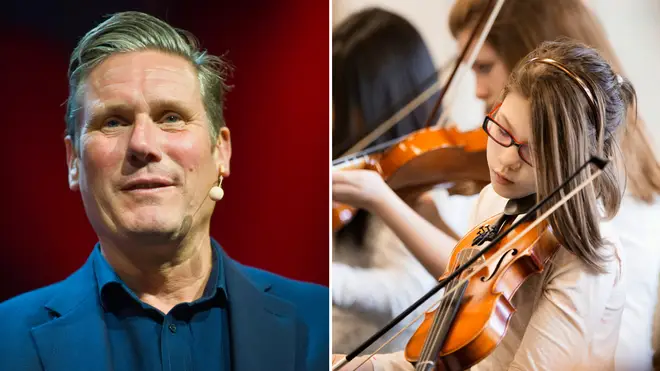‘We want every child to get the chance to play a musical instrument’ – Sir Keir Starmer
29 September 2021, 16:56 | Updated: 30 September 2021, 12:23

Sir Keir Starmer has used his first in-person conference speech as Labour leader to highlight the “collapse” of music and drama in state schools, and to address the lack of accessibility in music education.
Sir Keir Starmer appeared for his first in-person conference speech as Labour Party leader on the final day of the annual Labour Party conference 2021.
He used his platform to address multiple topics, including education recovery post-Covid in the UK, and the government’s handling of this issue.
The Labour leader added that education needs to “do more than just recover”; he believes education needs to also ensure it is preparing young people for work.
“Employers in all sectors tell me that they need well-rounded young people. Young people who can communicate and work in a team,” he said.
Starmer, who in his teenager years was a junior exhibitioner at the Guildhall School of Music & Drama, added: “That’s why it’s stupid to allow theatre, drama and music to collapse in state schools.”
Read more: A level music is ‘at risk of disappearing’ in little over a decade

Andrew Lloyd Webber criticises cuts to music education
Studying the arts has long been linked to the development of critical thinking skills, as well as helping with wellbeing and improving health and happiness.
In 2020, the exam group Cambridge University Press & Assessment, also found that taking a music qualification was linked to higher academic achievement overall.
However, following years of cuts to local and central government funding, experts are concerned that subjects like music will be phased out of the curriculum completely by as early as 2033.
This year, the government approved plans to cut funding for art and music courses by 50 percent across higher education institutions in England.
The move was criticised by multiple high-profile organisations, including the Musicians’ Union, who described the move as “devastating”.
.@OfficeStudents has confirmed that Government's catastrophic funding cut for HE arts & music subjects will go ahead.
— Musicians' Union (@WeAreTheMU) July 20, 2021
“Closing opportunities to learn music is short-sighted, and at the end of the day we’ll all suffer" - @NaomiPohl
Our full response 👇https://t.co/EWHSlhXWf5
Despite the cuts, a recent study commissioned by Rocksteady Music School found that four in five parents would still like their child to take music at GCSE or A level if there were no barriers in them doing so.
Starmer also used his speech to address barriers to subjects like music and drama, and how even before the pandemic, groups of young people were being left behind.
“By the time they finish their GCSEs, pupils from poorer families are 18 months behind their wealthier peers,” Starmer said. “That’s right. 18 months.”
Wealth differences between pupils in arts subjects are particularly visible, with pupils from more affluent backgrounds having access to private music instrument lessons among other advantages.
In 2018, a Yorkshire school even made the controversial decision to charge extra money for pupils wanting to take music GCSE after school, due to cuts in arts funding.
The labour leader addressed this divide, saying: “We want every child to get the chance to play competitive sport and play an instrument.
“When I was at school, I had music lessons with Fat Boy Slim, I can’t promise that for everyone,” he added.
“But I can promise that Labour, as the name tells you will make a priority of getting this country ready for work.”


































